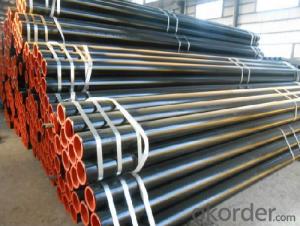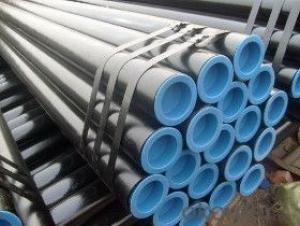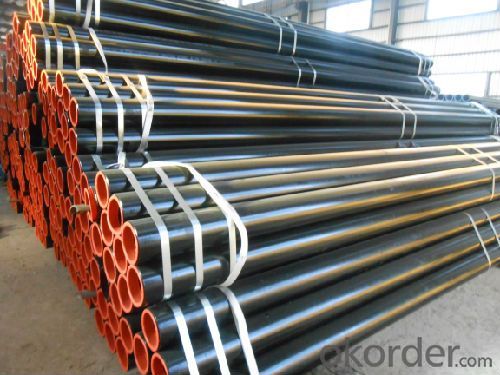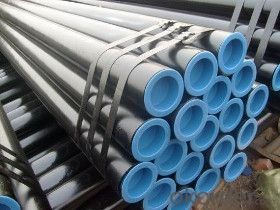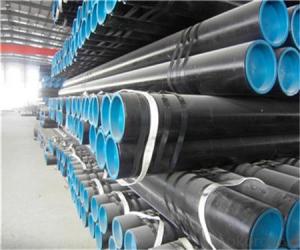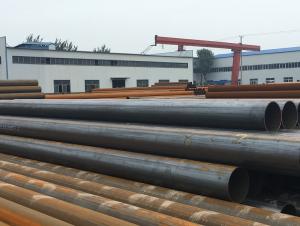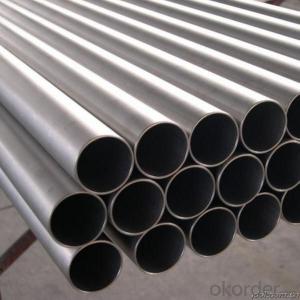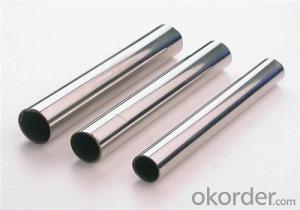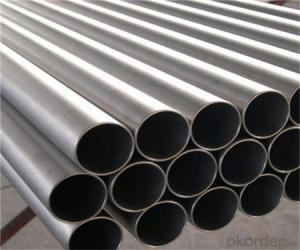Seamless Steel Tubes And Pipes China Manufacturer
- Loading Port:
- Tianjin
- Payment Terms:
- TT OR LC
- Min Order Qty:
- 25 m.t.
- Supply Capability:
- 12000 m.t./month
OKorder Service Pledge
OKorder Financial Service
You Might Also Like
1、Structure of Seamless Pipe GB5310:
Standard: GB5310: Seamless Steel Tubes And Pipes for High Pressure Boiler
• High manufacturing accuracy
• High strength
• Small inertia resistance
• Strong heat dissipation ability
• Good visual effect
• Reasonable price
2、Main Features of the Seamless Pipe GB5310:
Seamless pipe is formed by drawing a solid billet over a piercing rod to create the hollow shell. As the manufacturing process does not include any welding, seamless pipes are perceived to be stronger and more reliable. Historically seamless pipe was regarded as withstanding pressure better than other types, and was often more easily available than welded pipe.
3、Seamless Pipe GB5310:Specification:
Standard | GB, DIN, ASTM ASTM A106-2006, ASTM A53-2007 |
Grade | 10#-45#, 16Mn 10#, 20#, 45#, 16Mn |
Thickness | 8 - 33 mm |
Section Shape | Round |
Outer Diameter | 133 - 219 mm |
Place of Origin | Shandong, China (Mainland) |
Secondary Or Not | Non-secondary |
Application | Hydraulic Pipe |
Technique | Cold Drawn |
Certification | API |
Surface Treatment | factory state or painted black |
Special Pipe | API Pipe |
Alloy Or Not | Non-alloy |
Length | 5-12M |
Outer Diameter | 21.3-610mm |
Grade | 20#, 45#, Q345, API J55, API K55, API L80, API N80, API P110, A53B |
Standard | ASME, ASTM |
4、Packaging & Delivery
Packaging Details: | seaworthy package,bundles wrapped with strong steel strip |
Delivery Detail: | 15-30days after received 30%TT |
5、FAQ of Seamless Pipe GB5310:
Q1: Why buy Materials & Equipment from OKorder.com?
A1: All products offered byOKorder.com are carefully selected from China's most reliable manufacturing enterprises. Through its ISO certifications, OKorder.com adheres to the highest standards and a commitment to supply chain safety and customer satisfaction.
Q2: How do we guarantee the quality of our products?
A2: We have established an advanced quality management system which conducts strict quality tests at every step, from raw materials to the final product. At the same time, we provide extensive follow-up service assurances as required.
Q3: How soon can we receive the product after purchase?
A3: Within three days of placing an order, we will begin production. The specific shipping date is dependent upon international and government factors, but is typically 7 to 10 workdays.
6、Seamless Pipe GB5310 Images:
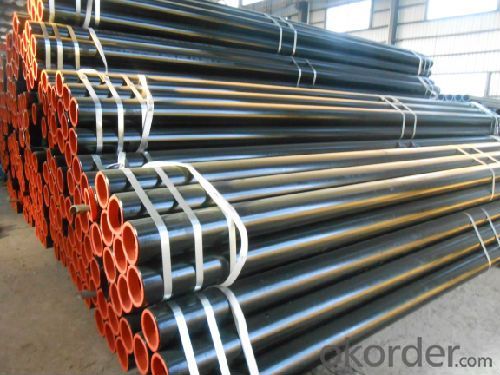
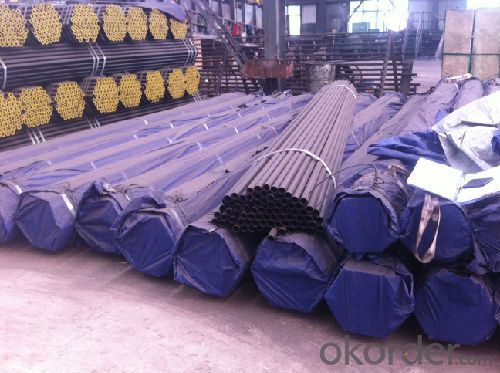
- Q: What is the role of steel pipes in the construction of bridges and tunnels?
- Steel pipes play a crucial role in the construction of bridges and tunnels. They are extensively used for various purposes due to their strength, durability, and versatility. In bridge construction, steel pipes are commonly employed for the fabrication of the bridge's structural framework. They serve as the primary load-bearing members, providing support and stability to the entire structure. Steel pipes are particularly favored in bridge construction due to their high tensile strength, which enables them to withstand heavy loads, including the weight of vehicles and the dynamic forces generated by traffic. Steel pipes are also utilized in the construction of bridge piers and abutments. These components provide the foundation and support for the bridge structure. Steel pipes are often driven deep into the ground to create sturdy foundations that can withstand the forces exerted by the bridge's weight and external factors such as wind, water currents, and seismic activity. Similarly, steel pipes are essential in tunnel construction. They are extensively used in tunnel lining, which refers to the installation of structural elements along the tunnel walls and roof to provide stability and prevent soil or rock collapse. Steel pipes are often used as reinforcement elements, ensuring the structural integrity of the tunnel and protecting it from external pressures. Moreover, steel pipes are employed for underground utility systems in both bridges and tunnels. They serve as conduits for various utilities such as water supply, electrical cables, gas pipelines, and communication lines. Steel pipes are ideal for these applications due to their corrosion resistance, ability to withstand high pressures, and longevity. Overall, the role of steel pipes in the construction of bridges and tunnels is to provide strength, stability, and durability to the structures. They play a vital role in ensuring the safety and functionality of these critical infrastructure projects, allowing for efficient transportation and the seamless provision of utilities.
- Q: What are the different types of steel pipe fittings?
- There are various types of steel pipe fittings, including elbows, tees, reducers, couplings, unions, plugs, caps, and flanges.
- Q: What are the different methods of joining steel pipes for steam applications?
- Some common methods of joining steel pipes for steam applications include welding, threading, and flanging. Welding involves melting and fusing the pipes together, creating a strong and permanent connection. Threading involves cutting grooves into the ends of the pipes and screwing them together using threaded fittings. Flanging involves using a flange to connect the pipes, which is then bolted together for a secure and leak-free connection. Each method has its own advantages and considerations depending on the specific application and requirements.
- Q: What is the purpose of pipe flanges in steel pipes?
- The purpose of pipe flanges in steel pipes is to provide a connection point between two pipe sections, allowing for easy assembly, disassembly, and maintenance of the pipeline. Flanges also help to create a leak-proof seal, enhance the strength and stability of the joint, and provide flexibility for expansion and contraction of the pipes.
- Q: What are the different coating options for steel pipes?
- Steel pipes have numerous coating options to choose from, each serving a specific purpose and offering unique advantages. Some common coating options for steel pipes include: 1. Fusion Bonded Epoxy (FBE) Coating: FBE coating is widely used across industries due to its exceptional corrosion resistance, impact resistance, and adhesion to the pipe surface. This coating is typically applied through a heat-induced chemical reaction, resulting in a durable and protective layer. 2. Polyethylene (PE) Coating: PE coating is commonly employed for underground steel pipes as it provides superior resistance against corrosion, abrasion, and chemicals. It is applied using extrusion techniques, forming a seamless layer that prevents moisture penetration. 3. Polyurethane (PU) Coating: PU coating is renowned for its outstanding resistance to abrasion, chemicals, and harsh environmental conditions. It is frequently used for steel pipes exposed to extreme temperatures or aggressive environments. Multiple layers of PU coating can be applied to enhance protection. 4. Coal Tar Enamel (CTE) Coating: CTE coating is a traditional choice for steel pipes requiring protection against corrosion. It is a thick, black coating that effectively resists water, soil, and atmospheric corrosion. This coating is typically applied using a hot-applied method. 5. Zinc Coating: Zinc coating, also known as galvanization, is a widely used protective coating for steel pipes. It involves applying a layer of zinc to create a barrier against corrosion. Zinc coating can be applied through hot-dip galvanization or electro-galvanization techniques. 6. Concrete Coating: Concrete coating is often utilized for steel pipes in underground or submerged applications. It provides a robust protective layer against corrosion, abrasion, and mechanical damage. Concrete coating is typically applied as a cement mortar or reinforced concrete layer. These options represent just a few of the available coatings for steel pipes. The selection of a coating depends on factors such as the intended application, environmental conditions, and desired durability. Choosing the appropriate coating is crucial to ensure the longevity and performance of steel pipes in various industries.
- Q: Can steel pipes be used for gas transportation?
- Yes, steel pipes can be used for gas transportation. Steel is a commonly used material for gas pipelines due to its strength, durability, and resistance to corrosion. Steel pipes are able to withstand high pressures and are suitable for transporting both natural gas and propane. They are also capable of withstanding extreme temperatures, making them ideal for gas transportation in various environments. Additionally, steel pipes can be welded together, allowing for a seamless and continuous pipeline system. However, it is important to ensure that the steel pipes used for gas transportation are properly coated and protected against corrosion to prevent any leaks or damage to the pipeline.
- Q: What are the applications of steel pipes in the automotive industry?
- Steel pipes are widely used in the automotive industry for various applications such as exhaust systems, fuel lines, and structural components. These pipes provide durability, high strength, and resistance to corrosion, making them ideal for withstanding the harsh conditions and requirements of automotive applications. Additionally, steel pipes are lightweight, cost-effective, and offer excellent formability, enabling efficient manufacturing and design flexibility for automotive manufacturers.
- Q: What are the applications of galvanized steel pipes?
- Galvanized steel pipes have a wide range of applications in various industries. They are commonly used in plumbing systems to deliver water and gas due to their excellent corrosion resistance. Additionally, they are used in the construction industry for structural purposes, such as scaffolding, fences, and handrails. Galvanized steel pipes are also utilized in the agricultural sector for irrigation systems and as posts for supporting crops. Furthermore, they find usage in oil and gas pipelines, HVAC systems, and automotive manufacturing. Overall, the applications of galvanized steel pipes are diverse, making them an essential material in multiple sectors.
- Q: How are steel pipes used in the construction of wind farms?
- Steel pipes are used in the construction of wind farms for various purposes, such as supporting wind turbine towers, providing a strong foundation for the turbines, and transmitting electricity generated by the turbines to the power grid.
- Q: How are steel pipes made?
- Steel pipes are made through a process called pipe manufacturing, which involves several steps. First, raw materials such as iron ore, coal, and limestone are melted in a blast furnace to produce molten iron. The molten iron is then mixed with recycled steel and processed in a basic oxygen furnace or electric arc furnace to refine its composition and remove impurities. Once the desired steel grade is achieved, it is cast into billets, which are heated and pierced to form a hollow cylindrical shape. These pierced billets are then elongated and shaped into pipes through a process called hot rolling or cold drawing. Finally, the pipes undergo various finishing operations, such as straightening, cutting, and inspection, before being ready for use in various applications.
Send your message to us
Seamless Steel Tubes And Pipes China Manufacturer
- Loading Port:
- Tianjin
- Payment Terms:
- TT OR LC
- Min Order Qty:
- 25 m.t.
- Supply Capability:
- 12000 m.t./month
OKorder Service Pledge
OKorder Financial Service
Similar products
Hot products
Hot Searches
Related keywords
